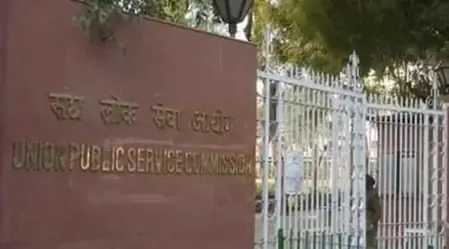Is UPSC Testing AI Facial Authentication Technology at Gurugram Exam Centres?

Synopsis
Key Takeaways
- UPSC has initiated a pilot test for AI facial authentication.
- The trial aims to ensure rapid and secure candidate verification.
- Verification time has been reduced to 8-10 seconds.
- The initiative helps combat impersonation in exams.
- Privacy measures are in place to protect candidates.
New Delhi, Sep 18 (NationPress) The Union Public Service Commission (UPSC) has recently executed a pilot assessment in Gurugram to evaluate AI-driven facial authentication technology aimed at ensuring rapid and secure verification of candidates during two examinations conducted earlier this month, as stated by an official on Thursday.
This anti-impersonation initiative, carried out in partnership with the National e-Governance Division (NeGD), was implemented during the National Defence Academy and Naval Academy II Examination 2025 and the CDS II Examination 2025, which took place on September 14, the official elaborated.
UPSC Chairman Ajay Kumar remarked, "The Commission is devoted to integrating state-of-the-art technology to maintain the utmost levels of fairness and transparency. This trial utilizing AI-based facial recognition marks a crucial advancement in our efforts towards a more intelligent, secure, and efficient examination process."
"While the UPSC is dedicated to modernizing its procedures, we have taken extensive measures to protect the integrity of our operations," he emphasized, indicating the built-in system to tackle concerns regarding candidates' privacy.
In a post on X, the UPSC Chief stated, "UPSC has successfully executed a trial of facial authentication at select locations in Gurgaon. The process was smooth and seamless — a significant move towards more intelligent, secure, and efficient exams."
An official announcement noted that this technology aims to bolster the integrity of the examination process while facilitating easier entry for candidates at examination venues.
The pilot program was conducted at designated centers in Gurugram, where candidates' facial images were digitally compared with the photographs they submitted during registration, Kumar explained.
This innovative system has reduced verification time to an average of 8 to 10 seconds per candidate, greatly simplifying entry into the examination venue while adding an additional layer of security.
During the pilot, approximately 2,700 successful scans were completed for 1,129 candidates across various sessions.
The successful implementation of this trial represents a significant milestone in utilizing advanced technology for more intelligent, secure, and efficient examinations.
The Union government has been actively enhancing the framework to combat impersonation and other fraudulent activities in examinations.
With penalties of up to 10 years in prison and fines reaching Rs 1 crore, the Public Examinations (Prevention of Unfair Means) Act, 2024 has introduced specific regulations aimed at tackling impersonation and other malpractices in government examinations.










